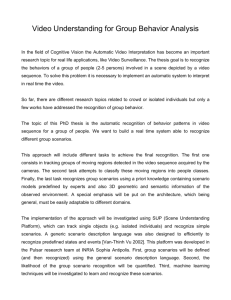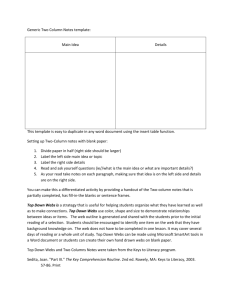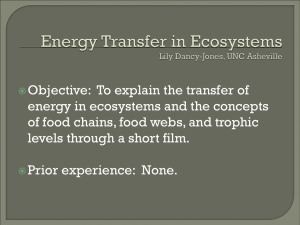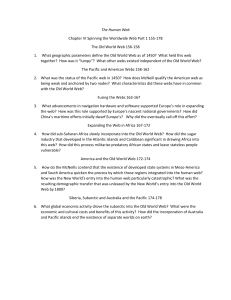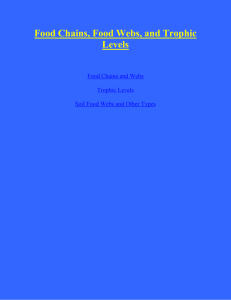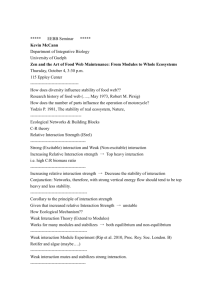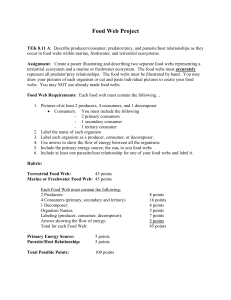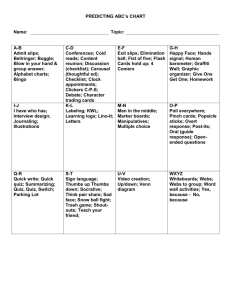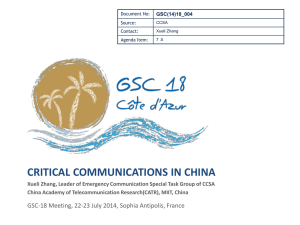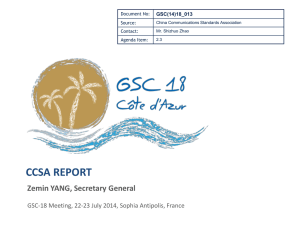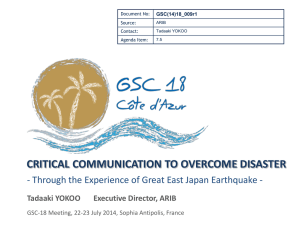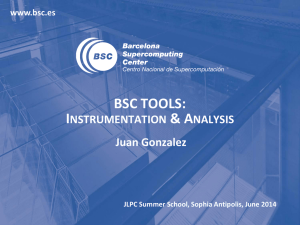Workshop IntraWebs 2006 - Call for papers - Sophia Antipolis
advertisement
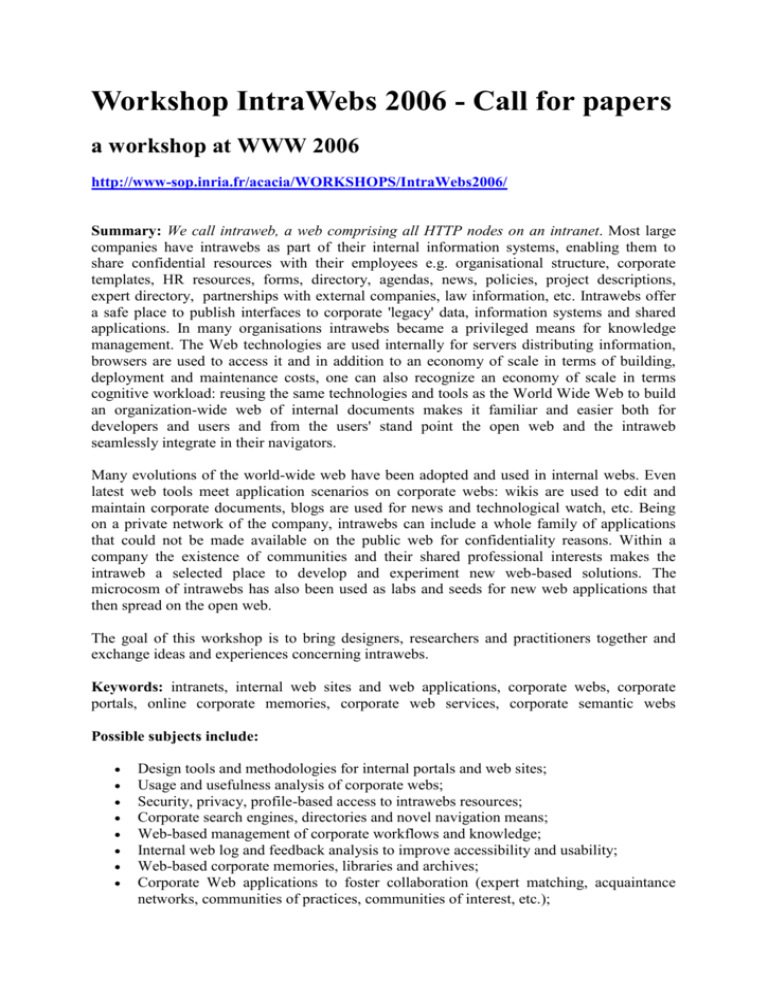
Workshop IntraWebs 2006 - Call for papers a workshop at WWW 2006 http://www-sop.inria.fr/acacia/WORKSHOPS/IntraWebs2006/ Summary: We call intraweb, a web comprising all HTTP nodes on an intranet. Most large companies have intrawebs as part of their internal information systems, enabling them to share confidential resources with their employees e.g. organisational structure, corporate templates, HR resources, forms, directory, agendas, news, policies, project descriptions, expert directory, partnerships with external companies, law information, etc. Intrawebs offer a safe place to publish interfaces to corporate 'legacy' data, information systems and shared applications. In many organisations intrawebs became a privileged means for knowledge management. The Web technologies are used internally for servers distributing information, browsers are used to access it and in addition to an economy of scale in terms of building, deployment and maintenance costs, one can also recognize an economy of scale in terms cognitive workload: reusing the same technologies and tools as the World Wide Web to build an organization-wide web of internal documents makes it familiar and easier both for developers and users and from the users' stand point the open web and the intraweb seamlessly integrate in their navigators. Many evolutions of the world-wide web have been adopted and used in internal webs. Even latest web tools meet application scenarios on corporate webs: wikis are used to edit and maintain corporate documents, blogs are used for news and technological watch, etc. Being on a private network of the company, intrawebs can include a whole family of applications that could not be made available on the public web for confidentiality reasons. Within a company the existence of communities and their shared professional interests makes the intraweb a selected place to develop and experiment new web-based solutions. The microcosm of intrawebs has also been used as labs and seeds for new web applications that then spread on the open web. The goal of this workshop is to bring designers, researchers and practitioners together and exchange ideas and experiences concerning intrawebs. Keywords: intranets, internal web sites and web applications, corporate webs, corporate portals, online corporate memories, corporate web services, corporate semantic webs Possible subjects include: Design tools and methodologies for internal portals and web sites; Usage and usefulness analysis of corporate webs; Security, privacy, profile-based access to intrawebs resources; Corporate search engines, directories and novel navigation means; Web-based management of corporate workflows and knowledge; Internal web log and feedback analysis to improve accessibility and usability; Web-based corporate memories, libraries and archives; Corporate Web applications to foster collaboration (expert matching, acquaintance networks, communities of practices, communities of interest, etc.); Web-based enterprise application integration; Corporate wikis, corporate blogs, corporate web services, corporate semantic webs, etc.; Connection of internal webs and external web. Motivations and objectives: Historically there has always been a synergy between world-wide web evolutions and intrawebs experiments. Many evolutions of the world-wide web have been adopted and used in internal webs and, vice-versa, many local initiatives on intrawebs turned out to be seeds of new web applications. Nowadays corporate webs are a de facto central piece of corporate information systems. However many options exist (architectures, technologies, policies, etc.) and we should foster the exchange of experiences. This workshops aims at providing a survey of the current trends on intrawebs, foster exchanges of returns on experience, discuss options available when building intrawebs, evaluation criteria and priorities (open vs. secure, content and indexing, etc.). Ideally, it would be the meeting point of a community of practice. This workshop is open: any person interested should have the opportunity to participate. We will rely on reviews by peers chosen from an international program committee; we intend to get three reviews per paper. Submission: Submissions should be sent to mailto:intrawebs2006@sophia.inria.fr Submission should follow the format of the WWW06 conference. Submitted papers may be up to 10 pages including all figures, tables, and references. Dates: Submissions deadline: 10 January 2006 Acceptance notifications: 1 February 2006 Workshop: May 22 (Mon) or May 23 (Tue), 2006 at WWW 2006, all workshop presenters must register for the conference before the early registration deadline. Steering committee: Fabien Gandon and Rose Dieng-Kuntz INRIA Acacia Research Team 2004 route des Lucioles, BP 93 06902 Sophia-Antipolis Cedex FRANCE Programme committee: Jean-Paul Barthès (Technological University of Compiègne) Richard Benjamins (iSoco) Sophie de Bonis (INRIA Sophia Antipolis) Bertrand Braunschweig (IFP) Michel Buffa (University of Nice - Sophia Antipolis) Olivier Corby (INRIA Sophia Antipolis) Oscar Corcho (University of Manchester) Aldo Gangemi (Institute for Cognitive Sciences and Technology, Roma) Alain Giboin (INRIA Sophia Antipolis) Asunción Gómez-Pérez (Universidad Politécnica de Madrid) Bernard Horan (Sun) Michel Klein (Vrije University) Alistair Miles (CCLRC Rutherford Appleton Laboratory) Colas Nahaboo (ILOG Sophia Antipolis) Amedeo Napoli (LORIA) Jean-Francois Nogier (Usabilis) Alun Preece (University of Aberdeen) Ulrich Reimer (University of Applied Sciences St. Gallen) Heiner Stuckenschmidt (Vrije University) York Sure (University of Karlsruhe)
